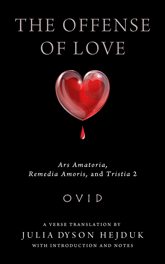The Offense of Love
Ars Amatoria, Remedia Amoris, and Tristia 2
Ovid
A verse translation by Julia Dyson Hejduk,
with introduction and notes
Finalist, National Translation Award for Poetry, American Literary Translators Association
A Choice Outstanding Academic Book
Wisconsin Studies in Classics
Matthew Roller, Laura McClure,
and Mark Stansbury-O’Donnell,
Series Editors
“The quality of Hejduk’s translations is consistently high: they combine
linguistic accuracy with a wit and verve that nicely rise to the challenge of
Ovidian humor and irony.”
—Gareth Williams, Columbia University
Ovid’s Art of Love (Ars Amatoria) and its sequel Remedies for Love (Remedia
Amoris) are among the most notorious poems of the ancient world. In AD 8, the
emperor Augustus exiled Ovid to the shores of the Black Sea for “a poem and a
mistake.” Whatever the mistake may have been, the poem was certainly the Ars
Amatoria, which the emperor found a bit too immoral.
In exile, Ovid composed Sad Things (Tristia), which included a defense of his
life and work as brilliant and cheeky as his controversial love manuals. In a poem
addressed to Augustus (Tristia 2), he argues, “Since all of life and literature is one
long, steamy sex story, why single poor Ovid out?” While seemingly groveling
at the emperor’s feet, he creates an image of Augustus as capricious tyrant and
himself as suffering artist that wins over every reader (except the one to whom it
was addressed).
Bringing together translations of the Ars Amatoria, Remedia Amoris, and
Tristia 2, Julia Dyson Hejduk’s The Offense of Love is the first book to include both
the offense and the defense of Ovid’s amatory work in a single volume. Hejduk’s
elegant and accurate translations, helpful notes, and comprehensive introduction
will guide readers through Ovid’s wickedly witty poetic tour of the literature,
mythology, topography, religion, politics, and (of course) sexuality of ancient
Rome.

Julia Dyson Hejduk is a professor
of classics at Baylor University. She is the author
of Clodia: A Sourcebook and King of the Wood:
The Sacrificial Victor in Virgil’s “Aeneid.”
|
| |

Ovid (Publius Ovidius Naso, 43 BC–AD 17)
was a popular Roman poet best known for his
multivolume poem of myth and history, Metamorphoses. |
Praise
“The verve and energy Hejduk musters and dedicates to these notorious and ironic poems will appeal to undergraduates, just as her nearly 60-page introduction and bibliography will appeal to scholars. . . . Hejduk provides the reader with a wickedly entertaining poetic tour of the literature, mythology, topography, religion, politics, and (of course) sexuality of ancient Rome. Highly recommended, undergraduates and above; general readers.”
—Choice
“To conjoin Tristia 2 with the Ars and Remedia is unique and an excellent idea. Hejduk is an accomplished translator and a scholar who has written widely on Ovid. The expectations raised by those
qualifications are not disappointed in the translation, which is accurate, readable, and true to the spirit and style of Ovid.”
—John F. Miller,
University of Virginia
Of Related Interest
|

Odes
Horace, translated and with commentary
by David R. Slavitt |
|

December 2014
LC: 2014009152 PA
294 pp. 6 x 9
|

